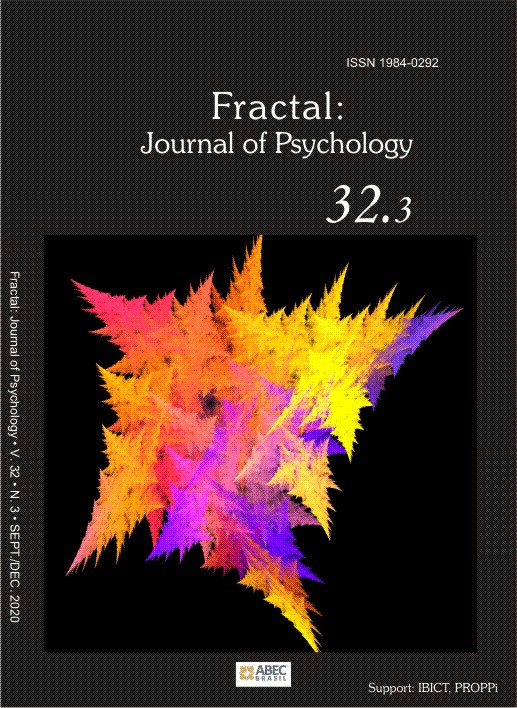Body in suffering, a life affirmation
DOI:
https://doi.org/10.22409/1984-0292/v32i3/5854Keywords:
suffering, happiness, affection, fragility, potentialityAbstract
This piece of writing aims to problematize the suppose empire of happiness we live in a currently days. We reproduce and comsume living standards without questioning what they have produce, putting ourselves happiness’s service as a way of reward. Itending to think about the way of suffering experience and weakness can be faced as an affirmative ethics of life, according to Nietzsche’s and Spinoza’s thoughts. This paper seeks to think beyond the complaining and negationists speeches about suffering wich end up minimizing the potentiality of life. In that measure, the body is enclosed and anesthetized to the sensitive experiences, while we are following manuals we believes containing de secret of a happy life, without space to experience of suffering. It also intends to find possibilities to deviate from this way of think about body and life, in order to make daily life lighter, seeing suffering and even death through new eyes, moving away from any moral or representational judgment.
Downloads
References
BECKETT, Samuel. O inominável. Tradução de Ana Helena Souza. São Paulo: Globo, 2009.
CHAMBERS, Adam Colin. Amor Fati. Tradução de Eclair Antônio Almeida Filho. Polichinello, Pará, n. 16, p. 21, out. 2014. Disponível em: https://issuu.com/polichinello/docs/16_18set. Acesso em: 4 out. 2020.
DELEUZE, Gilles. Mistério de Ariadne segundo Nietzsche. In: ______. Crítica e Clínica. Tradução de Peter Pál Pelbart. São Paulo: Editora 34, 1997.p. 114-129.
DELEUZE, Gilles; GUATTARI, Félix. Mil Platôs: capitalismo e esquizofrenia. Tradução de Aurélio Guerra Neto, Ana Lúcia de Oliveira, Lúcia Claudia Leão e Suely Rolnik. 2. ed. Rio de Janeiro: Ed. 34, 2012. v. 3.
KAFKA, Franz. Um artista da fome. São Paulo: Brasiliense, 1991.
LAPOUJADE, Davi. O corpo que não aguenta mais. In: GADELHA, Sylvio (Org.). Nietzsche e Deleuze: que pode o corpo. Rio de Janeiro: Relumé Dumará, 2002. p. 81-90.
MELVILLE, Herman. Bartleby: o escriturário. Tradução de Cássia Zanon. Porto Alegre: L&PM, 2008.
NIETZSCHE, Friedrich. A Gaia Ciência. Tradução, notas e posfácio de Paulo César de Souza. São Paulo: Companhia das Letras, 2001.
PELBART, Peter Pál. O corpo do informe. In: ______. Vida Capital: ensaios de biopolítica. São Paulo: Iluminuras, 2009. p. 42-51.
PELBART, Peter Pál; FERNANDES, Ricardo Muniz (Org.). Aos nossos amigos: crise e insurreição (Comitê Invisível). Tradução Edições Antipáticas. São Paulo: n-1, 2018.
SPINOZA, Benedictus. Ética. Tradução de Tomaz Tadeu. Belo Horizonte: Autêntica, 2009. Disponível em: https://www.academia.edu/37558151/%C3%89tica_Spinoza_Tradu%C3%A7%C3%A3o_de_Tomaz_Tadeu_pdf. Acesso em: 21 set. 2009.
Published
Versions
- 2021-01-05 (2)
- 2020-11-30 (1)
How to Cite
Issue
Section
License
Copyright (c) 2020 Bibiana Munhoz Roos, Angelica Vier Munhoz

This work is licensed under a Creative Commons Attribution 4.0 International License.
Authors publishing in this journal agree to the following terms:
- Authors retain copyright and grant the journal the right of first publication, with the work simultaneously licensed under the Creative Commons Attribution License allowing sharing of the work with acknowledgement of authorship of the work and initial publication in this journal.
- Authors are permitted to enter into additional contracts separately for non-exclusive distribution of the version of the work published in this journal (e.g., publishing in an institutional repository or as a book chapter), with acknowledgment of authorship and initial publication in this journal.

This work is licensed under a Creative Commons Attribution 4.0 International License.
To the extent possible under the law, Fractal: Journal of Psychology has waived all copyright and related rights to the Reference Lists in research articles. This work is published in: Brazil.
To the extent possible under law,Fractal: Journal of Psychology has waived all copyright and related or neighboring rights to Reference lists in research articles. This work is published from: Brazil.







